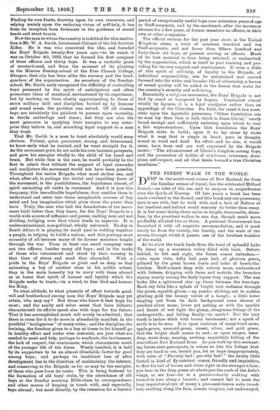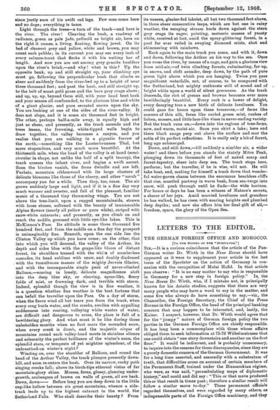THE FINEST WALK IN THE WORLD.
DEEP in the south-west corner of New Zealand; far from the familiar scenes of travel, lies the celebrated Milford Sound,—an inlet of the sea said to surpass in magnificence even the fjords of Norway. Of late years a track has been made overland to the Sound, and this track any one possessing eyes to see with, feet to walk with, and a love of Nature at her loneliest and loftiest could scarcely do better than essay. It is but some thirty-three miles in length, traversable, there- fore, by the practised walker in one day, though much more profitably allotted two or three. A paternal Government has furnished it with all requisite accommodation, and it must surely be, from the variety, the beauty, and the scale of the scenes through which it passes, one of the loveliest wonders of the world.
At its start the track leads from the head of splendid Lake Te Anau up a mountain valley filled with bush. Before, behind, to left and right, the forest comes unbroken,— vista upon vista, lofty hall past hall, of glorious green, pillared by the great brown limbs and boles of beech-like birches. Half-a-hand deep with velvety moss, embroidered with lichens, dripping with ferns and orchids, the branches zigzag mazily among the leafy layers they support. The sun looks like a splintered star up there between the tree-tops. Each ray falls like a splash of bright cool radiance through the green, equable gloom,—up yonder striking out to sudden glinting gold the bronzy velvet of a bough ; a little lower singling out from its dark background some shower of pendent silver moss; lower yet pelting as with the sparkle and dazzle of wet light the glossy, oleaginous foliage of the undergrowth; and falling finally—to earth ? No! the very track is inches thick with brown beechmast ; not a speck of earth is to be seen. It is upon cushions of many-hued moss, apple-green, emerald-green, russet, silver, and gold green, that the bright shaft comes to rest ; or upon surges, knee- deep, waist-deep, soaring, arching, exquisitely falling, of the marvellous New Zealand ferns. As you walk up this enchant- ing forest-aisle parroquets, in colour so like the foliage that they are hard to see, herald you, let us hope inappropriately, with cries of "Per-etty bad ! per-etty bad!" the dainty little fantail (a kind of fly-catcher) comes, friendly and inquisitive, to flirt his tail of brown and white right in the stranger's face; you hear in the deep green air above you the rush of the kaka's wings, or see him—he is a parrot—warily walking with turned-in toes along a branch; and cannot fail to meet the long inquisitorial eye of many a pheasant-brown weka (wood- hen) stalking along the fern, almost wingless, but undismayed,
since justly sure of his swift red legs. Few men come here and no dogs; everything is tame.
Light through the trees—a turn of the track—and here is the river. The river! Cleaving the bush, a roadway of radiance, green as pale jade, pellucid as bright air, here on
• the right it comes, a living, floating, flowing jewel. On its bed of cleanest grey and yellow, white and brown, you may count each pebble; in its current you may see every inch of every salmon-trout that flecks it with his waiting bar of length. And now you are out among grey granite boulders upon the river's brink,—and why ! what is this ? Up the opposite bank, up and still straight up, your climbing eye .must go, following the perpendicular bush that climbs so sheer and suddenly from the river-bed up to a height of near three thousand feet ; and past the bush, and still straight up, to the belt of scant gold grass and the bare grey crags above ; and up, up, up, beyond them still, with your head bent back and your senses all confounded, to the glorious blue and white of a giant glacier, and pure serrated snows upon the sky. You are looking at one of the sides of the river-valley. It does not slope, and it is some six thousand feet in height. The other, perhaps half-a-mile away, is equally high and just as sheer, and presently, as the track ascends and the trees lessen, the frowning, white-tipped walls begin to draw together, the valley becomes a canyon, and you realise that you are walking in a gigantic furrow of the earth,—something like the Lauterbrunnen Thal, but more stupendous, and very mach more beautiful. At the .thirteenth mile, when the head of the valley is at hand (semi- -circular in shape, not unlike the half of a split teacup), the 'track crosses the infant river, and begins a swift ascent. Soon the birches vanish, the ferns dwindle and are left. Fuchsia, mountain ribbonwood with its large clusters of delicate blossoms like those of the cherry, and other " scrub " accompany you for a while. Then they, too, cease. The air grows suddenly large and light, and if it is a fine day very
• much warmer and sweeter, and full of the pleasant, familiar music of a thousand tiny thrumming wings. You are out
• above the tree-limit, upon a rugged mountainside, strewn with loose stones, softened with the beauty of innumerable Alpine flowers (nearly all yellow or pure white), striped with snow-white cataracts ; and presently, as you climb on and - reach the saddle, gemmed with little eye-like lakes. This is McKinnon's Pass. Its altitude is some three thousand five hundred feet, and from the saddle on a fine day the prospect is unimaginably fine. Beneath, upon the one side lies the Clinton Valley up which you have come; on the other, that into which you will descend, the valley of the Arthur, its
• depth and sides blue with the grape-like bloom of distant . forest, its shoulders tressed with the white of numberless cascades, its head sublime with snow, and doubly diademed . with the tumultuous masses of the mighty Jervois Glacier, and with the incomparable single peak of never-climbed Balloon,—soaring in lonely, delicate magnificence aloft
• into the deep blue sky, or cleaving, spear-like, fleecy folds of mist, or frowning dark, and terrible with storm. Indeed, splendid though the view is in fine weather, it is a question whether fine weather is the best fortune that can befall the traveller upon the Pass. On a day of storm, when the fierce wind all but tears you from the track, when every crag hurls water, and the creeks, swollen with appalling suddenness into roaring, volleying white wastes of water, are difficult and dangerous to cross, the place is full of a bewildering glory.. And what must it be like during those nnbeholden months when no foot mars the mounded snow, • when every creek is dumb, and the majestic cirque of mountains round each valley-head meets in stainless silence and solemnity the perfect brilliance • of the winter's noon, the
• splendid stars, or tempests of yet mightier splendour, of the nnbreat bed-on winter's night ?
Winding on, over the shoulder of Balloon, and round the head of the Arthur Valley, the track plunges presently down- hill, and soon re-enters the bush. Over its narrow, rocky path singing creeks fall; above its birch-tips ethereal vistas of far • mountain-glory shine. Mosses, ferns, glossy, glancing under- . growth, arabesques of brown on walls of green, all are back. Down, down— Before long you are deep down in the little • cup-like hollow between six great mountains, whence a side- track leads up to the highest cataract in the world, the • Sutherland Falls. Who shall describe their beauty ? From
its unseen, glacier-fed lakelet, all but two thousand feet above, in three sheer consecutive leaps, which are but one in rainy weather, the escaping stream hurls down against . the stern grey crags its eager, pointing, meteoric masses of yeasty white, received at last, amid the spray-glittering forest; in a pool for ever veiled in swaying diamond mists, shot and shimmering with rainbows.
Back again to the main track you come, and with it, flown and down, following the Arthur on his way to the sea. Once you cross the river, by means of a cage, and gain a glorious view from inid-air,—of twin climbing forests, culminating, far•up, in snows, and cleft asunder, deep. down, by the path of pure green light above which you are hanging. Twice you, pass magnificent waterfalls, not, of course, to be compared with
the Sutherland, but mighty outbursts still of sound and ,. bright white upon a world of silent greenness. As the track descends, the riot of greens and browns becomes ever more bewilderingly beautiful. Every rock is a bower of delight, every decaying tree a new birth of delicate loveliness. You could gaze for hours upon these treasures,—of ferns like saucers of thin silk, ferns like curled green mist, ruches .of lichen, mosses, and little lace-like vines in never-ending variety. But the track runs on,—down into the regions of tree-ferns, now, and warm, moist air.. Soon you skirt a lake; here and there black snags peep out above the surface and mar the satin of its perfect reflections. It is really only a bit of forest, long ago submerged.
Down, and still down,—till suddenly a nimbler air, a wider water! and there before you stands the stately Mitre Peak, plunging down its thousands of feet of naked. scarp -and forest-tapestry, sheer into deep sea. The track stops here, perforce; but the traveller, if he is wise, will not. He will take boat, and, making for himself a track down that wonder- ful water-paven chasm between the enormous beachless cliffs that rise, mantled partway in warm bush, from sea-verge into snow, will push through until he finds—the wide horizon. For hours or days he has been a witness of Nature's secrets, a sharer of her joys. Amid married loveliness and grandeur he has walked, he has risen with soaring heights and plumbed deep depths; and now she offers him her final gift of all— freedom, space, the glory of the Open Sea.











































 Previous page
Previous page